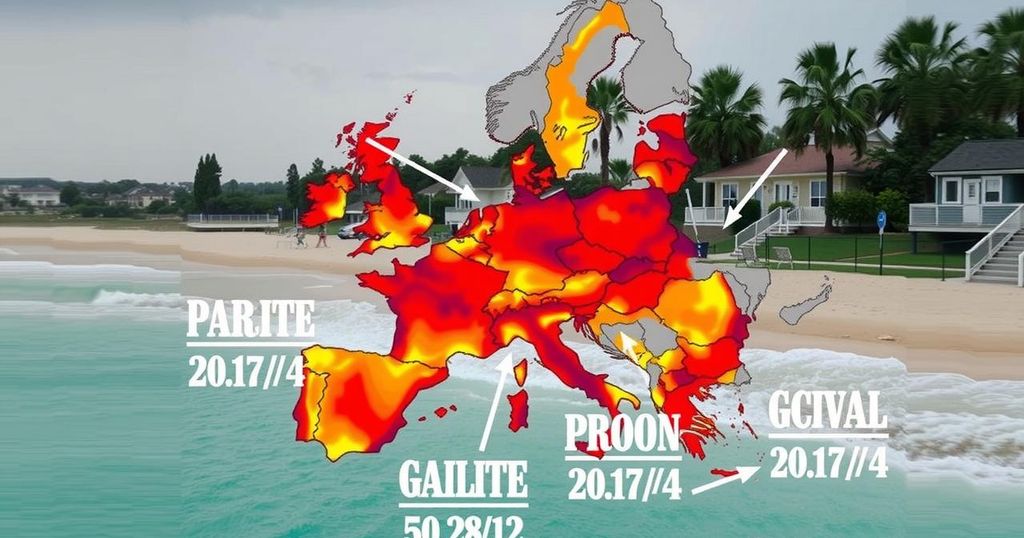2024 Confirmed as Record Hottest Year by WMO Amidst Climate Crisis

The World Meteorological Organization has confirmed that 2024 is the hottest year recorded, with temperatures 1.55 degrees Celsius above pre-industrial levels. This year highlights the growing impacts of climate change, as demonstrated by recent wildfires in Los Angeles. The findings serve as a critical reminder for governments to renew their climate action commitments to mitigate extreme weather events and global warming effects.
The World Meteorological Organization (WMO) recently confirmed that 2024 has emerged as the hottest year recorded, with global temperatures 1.55 degrees Celsius above pre-industrial levels. This alarming data coincides with severe wildfires in Los Angeles that have displaced thousands, underscoring the connection between climate change and extreme weather events. WMO spokesperson Clare Nullis emphasized the extraordinary temperatures seen in land and ocean environments that have devastated lives globally.
The significance of the 1.5 degrees Celsius threshold stems from the goals outlined in the 2015 Paris Agreement, which aims to limit global temperature rise to that level to mitigate severe climate impacts. Despite the new record, WMO Secretary-General Celeste Saulo stressed the importance of long-term efforts, noting the alarming trend of consistent record-breaking temperatures over the past decade.
Recent findings indicate that climate change exacerbated the disastrous wildfires in Los Angeles, attributed to increasingly dry and windy weather patterns. UN Secretary-General António Guterres highlighted the urgency of this situation, calling on governments to renew their climate action commitments to achieve the established temperature goals. He remarked that while individual years may exceed the 1.5-degree limit, they emphasize the necessity for intensified climate action in the years to come.
Moreover, a recent scientific study revealed that the oceans are at unprecedented warmth levels, particularly in the upper 2,000 meters where about 90% of excess heat from global warming is stored. The findings indicated a significant increase of 16 zettajoules in heat content from 2023 to 2024, underscoring the global heating crisis.
In summary, the confirmation of 2024 as the hottest year serves as a critical reminder of the urgent need for comprehensive climate action to prevent further environmental degradation and socio-economic upheaval.
Understanding the rise in global temperatures is crucial in the context of climate change. The Paris Agreement, established during the 2015 United Nations Climate Change Conference, aims to limit global warming to 1.5 degrees Celsius above pre-industrial levels to avoid catastrophic impacts. Recent patterns of rising temperatures have raised alarms among climate scientists and policymakers, particularly as they correlate with significant and hazardous weather events, such as the wildfires in Los Angeles. The persistent accumulation of heat in the oceans further illustrates the urgency of addressing climate-related issues. The findings from the WMO connect these temperature changes directly to human activities and underscore the importance of long-term goals over individual yearly fluctuations, reinforcing the necessity for immediate action to ensure sustainable environmental practices. This scientific consensus highlights the critical role of various global agencies, including NASA and the European Weather Forecast Center, in monitoring climate changes and informing the public and policymakers about the implications of these developments.
The confirmation of 2024 as the hottest year on record by the WMO emphasizes the pressing reality of climate change and its effects worldwide. With temperatures significantly exceeding critical thresholds, it becomes imperative for world leaders to take decisive actions to curtail greenhouse gas emissions and enhance climate resilience. The clear link between extreme weather events and rising temperatures illustrates the need for collective global efforts to achieve established climate goals, particularly in light of the ongoing environmental crises, underscoring that time is of the essence in the fight against climate change.
Original Source: www.connectedtoindia.com






